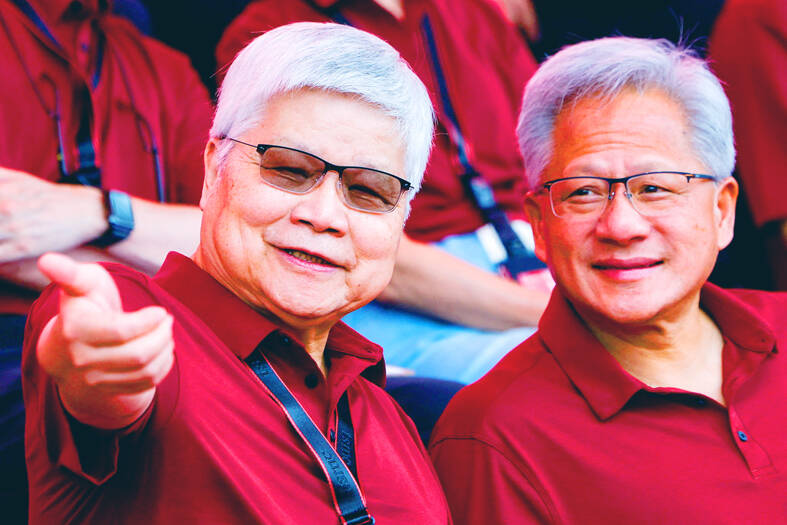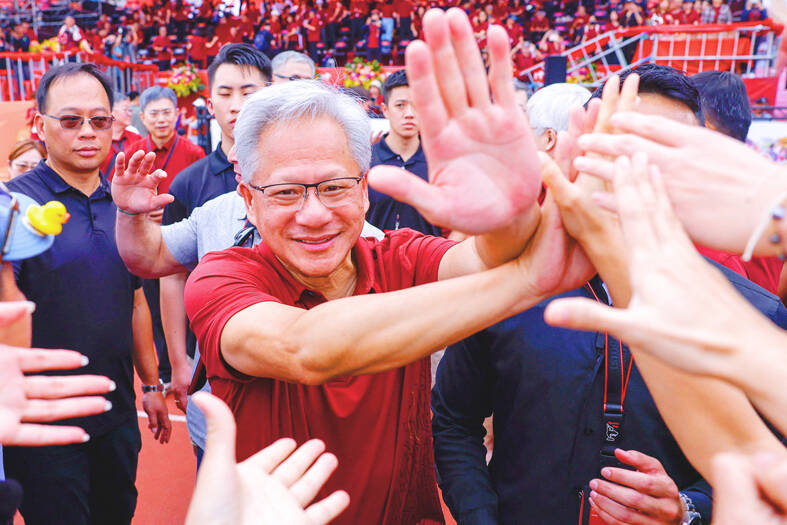Taiwan Semiconductor Manufacturing Co (TSMC, 台積電) is the pride of Taiwan and the nation’s position in the global semiconductor supply chain remains unwavering, Nvidia Corp chief executive officer Jensen Huang (黃仁勳) said yesterday.
Huang, who arrived on Friday afternoon in Tainan, made the remarks at TSMC’s annual sports day event at Hsinchu County Stadium. During his trip, he also visited TSMC’s 3-nanometer fab at the Southern Taiwan Science Park (南部科學園區).
In his address at the TSMC event, Huang said that 30 years ago, TSMC and Nvidia were two small companies.

Photo: Ann Wang, Reuters
“You [TSMC] are the pride of Taiwan. You are also the pride of the world,” he said.
“Nvidia is not possible without you. We have built two incredible companies,” he added. “I want to thank all of you for helping me build Nvidia.”
In response to media queries on whether the US-China competition in artificial intelligence (AI) would affect Taiwan’s position in the industry, Huang said that AI would influence every country, every company and everyone.

Photo: Ann Wang, Reuters
AI is the most important technology of all time, so the world should value and develop the technology, he said.
Taiwan plays a pivotal role in the development of AI, as it is a global semiconductor powerhouse, he added.
Nvidia is receiving “very strong demand” for its state-of-the-art Blackwell chips, and its appetite for wafers manufactured by TSMC grows, he said.
“Nvidia builds the GPU [graphics processing units], but we also build the CPU [central processing units], the networking, the switches ... so there are a lot of chips associated with Blackwell,” he said.
TSMC chairman C.C. Wei (魏哲家) said that Huang had “asked for wafers,” but the amount of his order was confidential.
“TSMC is doing a very good job supporting us on wafers,” Huang said, adding that he saw Nvidia’s new “Rubin” chips on the production line.
Huang said TSMC’s sports day is like the company’s “family day,” and it was an honor to be part of it.
Asked about Google LLC’s Tensor processing unit and Amazon.com Inc’s development of application-specific integrated circuits, Huang said there are differences.
Nvidia’s GPU can be applied to many scientific fields such as quantum computing, biology and physics, and process massive amounts of data, he said.
It is more accommodating, as it can be used in almost every cloud and every data center, he added.
Asked how concerned he was about memory shortages, Huang said that business was growing strongly and there would be shortages of “different things.”
“We have three very, very good memory makers — SK Hynix, Samsung, Micron — which are all incredibly good memory makers, and they have scaled up tremendous capacity to support us,” he said.
Nvidia has received the most advanced chip samples from all three memory makers, he said.
South Korea’s SK Hynix last week said it had sold out all its chip production for next year and planned to sharply boost investments, expecting an extended chip “super cycle” spurred by the AI boom.
Samsung said it was in “close discussion” to supply its next-generation high-bandwidth memory chips, or HBM4, to Nvidia.
On Friday, Huang said there were “no active discussions” about selling Blackwell chips — Nvidia’s flagship AI chip — to China.
The administration of US President Donald Trump has embargoed such sales, saying they could aid the Chinese military and China’s AI industry.
Additional reporting by CNA

A Ministry of Foreign Affairs official yesterday said that a delegation that visited China for an APEC meeting did not receive any kind of treatment that downgraded Taiwan’s sovereignty. Department of International Organizations Director-General Jonathan Sun (孫儉元) said that he and a group of ministry officials visited Shenzhen, China, to attend the APEC Informal Senior Officials’ Meeting last month. The trip went “smoothly and safely” for all Taiwanese delegates, as the Chinese side arranged the trip in accordance with long-standing practices, Sun said at the ministry’s weekly briefing. The Taiwanese group did not encounter any political suppression, he said. Sun made the remarks when

PREPAREDNESS: Given the difficulty of importing ammunition during wartime, the Ministry of National Defense said it would prioritize ‘coproduction’ partnerships A newly formed unit of the Marine Corps tasked with land-based security operations has recently replaced its aging, domestically produced rifles with more advanced, US-made M4A1 rifles, a source said yesterday. The unnamed source familiar with the matter said the First Security Battalion of the Marine Corps’ Air Defense and Base Guard Group has replaced its older T65K2 rifles, which have been in service since the late 1980s, with the newly received M4A1s. The source did not say exactly when the upgrade took place or how many M4A1s were issued to the battalion. The confirmation came after Chinese-language media reported

The Taiwanese passport ranked 33rd in a global listing of passports by convenience this month, rising three places from last month’s ranking, but matching its position in January last year. The Henley Passport Index, an international ranking of passports by the number of designations its holder can travel to without a visa, showed that the Taiwan passport enables holders to travel to 139 countries and territories without a visa. Singapore’s passport was ranked the most powerful with visa-free access to 192 destinations out of 227, according to the index published on Tuesday by UK-based migration investment consultancy firm Henley and Partners. Japan’s and

BROAD AGREEMENT: The two are nearing a trade deal to reduce Taiwan’s tariff to 15% and a commitment for TSMC to build five more fabs, a ‘New York Times’ report said Taiwan and the US have reached a broad consensus on a trade deal, the Executive Yuan’s Office of Trade Negotiations said yesterday, after a report said that Washington is set to reduce Taiwan’s tariff rate to 15 percent. The New York Times on Monday reported that the two nations are nearing a trade deal to reduce Taiwan’s tariff rate to 15 percent and commit Taiwan Semiconductor Manufacturing Co (TSMC, 台積電) to building at least five more facilities in the US. “The agreement, which has been under negotiation for months, is being legally scrubbed and could be announced this month,” the paper said,